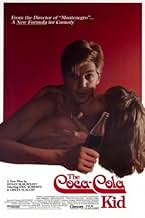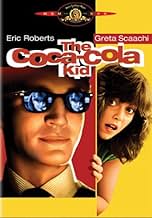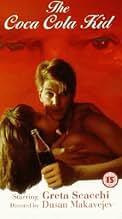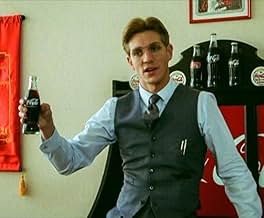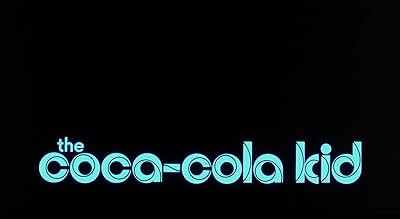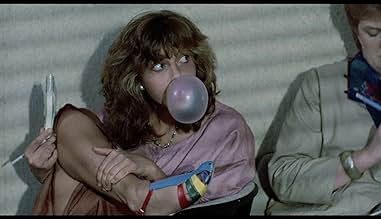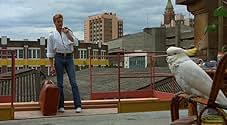AVALIAÇÃO DA IMDb
5,9/10
3,7 mil
SUA AVALIAÇÃO
Adicionar um enredo no seu idiomaEx-marine turned Coca-Cola marketing guru Becker is on a mission to boost sales in Australia when he discovers a dry spot in the Outback, where everyone is guzzling homegrown brew - and not ... Ler tudoEx-marine turned Coca-Cola marketing guru Becker is on a mission to boost sales in Australia when he discovers a dry spot in the Outback, where everyone is guzzling homegrown brew - and not a drop of his company's cola.Ex-marine turned Coca-Cola marketing guru Becker is on a mission to boost sales in Australia when he discovers a dry spot in the Outback, where everyone is guzzling homegrown brew - and not a drop of his company's cola.
- Direção
- Roteiristas
- Artistas
- Prêmios
- 8 indicações no total
Avaliações em destaque
Makavejev's recipe for finally making some money. And it works! This is in the same time his worst and most famous movie. The stupid Hollywood comedy part and casting attracts random public and secures watchability for everyone, and the other art part was fun to make in his own surrealist style and observe the reactions, including the one from the coca cola company. How did a Serbian avanguard director get to organize such a team and set (action star Eric Roberts as an American marketing guru sent to Australia) remains a funny mystery to me. Every Makavejev movie is completely different so even here it was hard to imagine where will the movie go, this is the first one that made me laugh. Eric is actually very good, Greta Scacchi even better(!), and i also liked the guy with pipe, all the acting is decent, but i think the real star is the little girl (Rebecca Smart), she's just brilliant. So this is basically a crossroad: if you liked the part that made "no" sense google Makavejev, otherwise keep with Eric Roberts.
Lots of local (Australian) colour and fun being made of corporate America. This is what we like. :-)
It's about 10 years since I last saw the film and I still sometimes finding myself humming the song, "choke back the tears when there's no Coca-Cola".
Not a great film, but another welcome Aussie comedy.
It's about 10 years since I last saw the film and I still sometimes finding myself humming the song, "choke back the tears when there's no Coca-Cola".
Not a great film, but another welcome Aussie comedy.
Call me strange, call me tasteless, but I found this film to be one of those movies that haunts me. Eric Roberts as the gung-ho Coke executive out to undo T.George McDowell's stranglehold on outback softdrink sales is just amazing. The scene near the beginning where Roberts is scanning an electronic map showing per capita Coke sales throughout Australia is brilliant, especially as they get down into the outback areas and discover that not only are Coke sales slim, but in one area, utterly non-existent.
Roberts' growing relationship with Greta Sciacci's character and DMZ, played wonderfully by child actress Rebecca Smart, weaves a romantic thread throughout the film, touching us even as we feel the intense need to thwap him over the head and make him see that this is the woman for him.
The scene of Coke trucks driven by Santa Claus costumed drivers pouring into T. George's compound is a killer, especially with that jingle (Sung by Neil Finn of Crowded House fame) roaring in the background. I can't understand why Coke has not purchased the rights to this jingle and used it in its advertising. Like another reviewer, I can't get that jingle out of my mind, even 15 years after seeing the movie.
Roberts' growing relationship with Greta Sciacci's character and DMZ, played wonderfully by child actress Rebecca Smart, weaves a romantic thread throughout the film, touching us even as we feel the intense need to thwap him over the head and make him see that this is the woman for him.
The scene of Coke trucks driven by Santa Claus costumed drivers pouring into T. George's compound is a killer, especially with that jingle (Sung by Neil Finn of Crowded House fame) roaring in the background. I can't understand why Coke has not purchased the rights to this jingle and used it in its advertising. Like another reviewer, I can't get that jingle out of my mind, even 15 years after seeing the movie.
The opening titles for The Coca-Cola Kid make it clear that the film is in no way sponsored by Coca-Cola or the Coca-Cola bottling company. Obviously the company felt comfortable enough with the final product to let the film use their name, but it's hardly a glowing picture of the soft drink giant. In The Coca-Cola Kid, Coca-Cola is the face of American Imperialism. When company trouble shooter Becker (Eric Roberts) declares, "The world will not be truly free until Coke is available everywhere," he's speaking without irony. This film, then, is about Becker's attempts to help Coca-Cola colonize Australia, but what starts off as a film of comic promise and originality becomes bogged down in convention and cliché to the point that it's difficult by the final reel to remember what was so appealing at the beginning.
The Coca-Cola Kid fits nicely in the genre of American Corporate Fish Out Of Water tales. If you've seen the delightful Local Hero, for example, you'll know that no matter what kind of tough American goes off to the rural wasteland, he'll change, enlightened by the small town quirks and wisdom he was meant to subvert. That's not really giving anything away in this film, because the last act doesn't play out as you expect. In fact, it hardly plays out at all.
Becker arrives in Australia to help boost lagging sales. It turns out that there's a whole region of the country where no Coke is sold at all. Becker, a former marine with the proverbial "unorthodox way of doing business," discovers that that region is ruled over by T. George McDowell (Bill Kerr) a gruff man of homespun wisdom, but more importantly, homemade soft drinks, made from real fruit. Even though their first encounter is rough, Becker is determined to fight off the advances of his secretary-with-a-secret (Greta Scacchi) and the hotel waiter who mistakes him for an arms dealer to do the job he was sent to do.
Directed by Dusan Makavejev, The Coca-Cola Kid develops a wonderful momentum early on. In fact, the first hour of the film is an absolute gem. Eric Roberts's performance to that point is perfect. His presentation to the bemused Coke officials is comic gold, as he waxes poetic about the fizzy beverage, even holding it up to the light bathing the room in its brown glow. Roberts's early scenes with Scacchi have a nice screwball touch and his interactions with Scacchi's moppet daughter provide a nice depth for the character, hinting at something beyond his intensity. There's a nifty sequence where Becker enlists a studio band to try to come up with the "sound of Australia" where they go through several absurd suggestions before coming up with a truly catchy jingle.
I'm not sure how far it is into the movie, but for me things begin to go south immediately after that recording session. For reasons completely unclear to me, the secretary has Becker invited to a party to catch him in an awkward position. This involves completely random intimations of homosexuality and ends of feeling both forced and pointless. The scene is so clumsy that it leaves a bad taste that begins to spread.
It rapidly becomes clear that The Coca-Cola Kid isn't going to omit a single convention of Australian culture. You want an old bushman with a diggerydoo (inevitably misspelled, but my dictionary is letting me down)? You've got it. An adorable wounded Kangaroo? Bingo! And a slightly inbred man singing a rousing chorus of "Walzing Matilda?" Yup-Yup. In fact, the vision of Australia put forth by the film is so cookie-cutter that it's hard to feel bad about the culture being overrun by American interests. You support Coke because you figure they're at least putting forth a good product.
Eric Roberts's performance finally ends up being a little infuriating because he's not given any opportunity or reason to be anything other than amusingly scary. The film falls apart at just the point you wish Roberts would go through the obligatory character alteration, but there's just no chance. He's stranded. Ditto Scacchi. She adorable and makes the sexiest Santa in the history of cinema, but her character's payoff is weak. Bill Kerr is excellent for the most part, but you can't help but feel that his cagey old Outback Vet is a character we've seen a thousand times.
The Coca-Cola Kid's best and most consistent feature is its cinematography by Dean Semler. The Oscar winner (for Dances With Wolves) does what the script and director can't do -- he creates the ironic counterpoint between the Outback, the big city, and Eric Roberts. The film has a dynamic look which, unlike the narrative, doesn't fall apart at the end.
I do feel bad about only giving this movie a 6/10, but I guess I should have just turned it off early. Off to drink a Coke...
The Coca-Cola Kid fits nicely in the genre of American Corporate Fish Out Of Water tales. If you've seen the delightful Local Hero, for example, you'll know that no matter what kind of tough American goes off to the rural wasteland, he'll change, enlightened by the small town quirks and wisdom he was meant to subvert. That's not really giving anything away in this film, because the last act doesn't play out as you expect. In fact, it hardly plays out at all.
Becker arrives in Australia to help boost lagging sales. It turns out that there's a whole region of the country where no Coke is sold at all. Becker, a former marine with the proverbial "unorthodox way of doing business," discovers that that region is ruled over by T. George McDowell (Bill Kerr) a gruff man of homespun wisdom, but more importantly, homemade soft drinks, made from real fruit. Even though their first encounter is rough, Becker is determined to fight off the advances of his secretary-with-a-secret (Greta Scacchi) and the hotel waiter who mistakes him for an arms dealer to do the job he was sent to do.
Directed by Dusan Makavejev, The Coca-Cola Kid develops a wonderful momentum early on. In fact, the first hour of the film is an absolute gem. Eric Roberts's performance to that point is perfect. His presentation to the bemused Coke officials is comic gold, as he waxes poetic about the fizzy beverage, even holding it up to the light bathing the room in its brown glow. Roberts's early scenes with Scacchi have a nice screwball touch and his interactions with Scacchi's moppet daughter provide a nice depth for the character, hinting at something beyond his intensity. There's a nifty sequence where Becker enlists a studio band to try to come up with the "sound of Australia" where they go through several absurd suggestions before coming up with a truly catchy jingle.
I'm not sure how far it is into the movie, but for me things begin to go south immediately after that recording session. For reasons completely unclear to me, the secretary has Becker invited to a party to catch him in an awkward position. This involves completely random intimations of homosexuality and ends of feeling both forced and pointless. The scene is so clumsy that it leaves a bad taste that begins to spread.
It rapidly becomes clear that The Coca-Cola Kid isn't going to omit a single convention of Australian culture. You want an old bushman with a diggerydoo (inevitably misspelled, but my dictionary is letting me down)? You've got it. An adorable wounded Kangaroo? Bingo! And a slightly inbred man singing a rousing chorus of "Walzing Matilda?" Yup-Yup. In fact, the vision of Australia put forth by the film is so cookie-cutter that it's hard to feel bad about the culture being overrun by American interests. You support Coke because you figure they're at least putting forth a good product.
Eric Roberts's performance finally ends up being a little infuriating because he's not given any opportunity or reason to be anything other than amusingly scary. The film falls apart at just the point you wish Roberts would go through the obligatory character alteration, but there's just no chance. He's stranded. Ditto Scacchi. She adorable and makes the sexiest Santa in the history of cinema, but her character's payoff is weak. Bill Kerr is excellent for the most part, but you can't help but feel that his cagey old Outback Vet is a character we've seen a thousand times.
The Coca-Cola Kid's best and most consistent feature is its cinematography by Dean Semler. The Oscar winner (for Dances With Wolves) does what the script and director can't do -- he creates the ironic counterpoint between the Outback, the big city, and Eric Roberts. The film has a dynamic look which, unlike the narrative, doesn't fall apart at the end.
I do feel bad about only giving this movie a 6/10, but I guess I should have just turned it off early. Off to drink a Coke...
This is one of the most fantastic movies ever made.
I'm not kidding.
Essentially the movie is about corporate America vs. Australia. More broadly, the film is about American corporate imperialism and a country's attempt to resist it.
Eric Roberts plays the gung-ho American coca-cola executive ("the marines have landed on every continent except Australia.. AND HERE I AM!"), intent on establishing a coca-cola franchise in the heart of Australia. The stubbornly independent Australians resist the American businessman with their own brand of humour and subversiveness.
Watch for several layers of meaning throughout the film. Especially the "Waltzing Matilda" scene.
Notable quote: "We have bottling franchises in every country on the planet. Including the moon."
A brilliant movie that will change your life.. or a movie that you'll ignore.
I'm not kidding.
Essentially the movie is about corporate America vs. Australia. More broadly, the film is about American corporate imperialism and a country's attempt to resist it.
Eric Roberts plays the gung-ho American coca-cola executive ("the marines have landed on every continent except Australia.. AND HERE I AM!"), intent on establishing a coca-cola franchise in the heart of Australia. The stubbornly independent Australians resist the American businessman with their own brand of humour and subversiveness.
Watch for several layers of meaning throughout the film. Especially the "Waltzing Matilda" scene.
Notable quote: "We have bottling franchises in every country on the planet. Including the moon."
A brilliant movie that will change your life.. or a movie that you'll ignore.
Você sabia?
- CuriosidadesThis film was produced without the knowledge or consent of the international offices of the Coca-Cola Company. However, since both the company and its product were depicted so favorably in the film (as well as the film being free advertising), they took no legal action against the parties involved.
- Erros de gravaçãoThe room service man hands Becker a silenced revolver. With the exception of obsolete Russian Nagant M1895, revolvers are not able to be suppressed because the cylinder/barrel gap allows hot gas, and therefore sound, to escape.
- Cenas durante ou pós-créditosCatering: 'Kaos' (Highly recommended by the whole cast & crew)
- Versões alternativasThe 2002 MGM DVD fades out the music and ends the movie as the credits end, but the original film continues the end credits song "Home for My Heart" over a black screen for about 50 seconds and then fades it out.
- Trilhas sonorasHome For My Heart
Composed & written by Tim Finn
Performed by Tim Finn, Phil Manzanera, Alan Spenner, Charlie Morgan & Guy Fletcher
Produced by Phil Manzanera, Cup/Enz Productions
With the permission of CBS/Mushroom Records, Mushroom Music & Enz Music
Principais escolhas
Faça login para avaliar e ver a lista de recomendações personalizadas
- How long is The Coca-Cola Kid?Fornecido pela Alexa
Detalhes
- Data de lançamento
- País de origem
- Idioma
- Também conhecido como
- The Coca-Cola Kid
- Locações de filme
- Empresas de produção
- Consulte mais créditos da empresa na IMDbPro
Bilheteria
- Faturamento bruto mundial
- US$ 93
- Tempo de duração1 hora 38 minutos
- Mixagem de som
- Proporção
- 1.85 : 1
Contribua para esta página
Sugerir uma alteração ou adicionar conteúdo ausente

Principal brecha
By what name was Coca-Cola Kid (1985) officially released in India in English?
Responda

